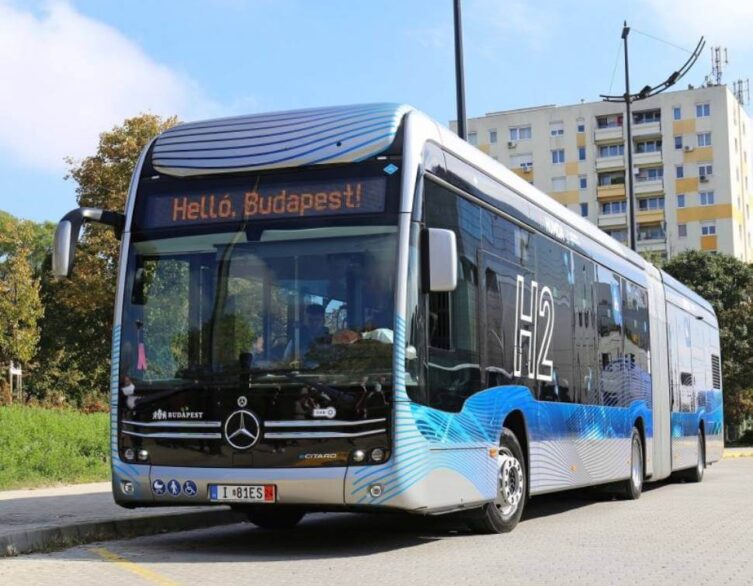Budapest Welcomes New Hydrogen-Powered Buses for Testing

Budapest, the vibrant capital of Hungary, is taking a significant step towards greener public transportation. The city has recently welcomed a new hydrogen-powered bus, the Mercedes-Benz eCitaro Fuel Cell, for a week-long trial run. This innovative vehicle combines electric and hydrogen technology, offering a glimpse into the future of sustainable urban mobility.
The Arrival of the Mercedes-Benz eCitaro Fuel Cell
On October 7, 2024, the Mercedes-Benz eCitaro Fuel Cell arrived in Budapest for a highly anticipated testing period. The Budapest Transport Company (BKV) announced that this state-of-the-art vehicle would be operating on the 8E bus route, running between Újpalota and Kelenföld. Passengers will have the opportunity to ride the bus free of charge during the trial period, as the BKV is eager to gather feedback from the public.
Features and Benefits of the Hydrogen-Electric Hybrid Bus
The Mercedes-Benz eCitaro Fuel Cell is a cutting-edge vehicle that combines the best of both worlds – electric and hydrogen power. This hybrid system allows for an extended range compared to purely electric buses. While a standard electric bus can travel around 280 kilometers on a single charge, the hydrogen-powered version can cover an impressive 800 kilometers. Moreover, refueling the hydrogen tanks takes a mere 10 minutes, significantly reducing downtime compared to the hours required for charging electric buses.
In addition to its efficient powertrain, the eCitaro Fuel Cell boasts a host of modern features. It is equipped with a low-floor design, ensuring accessibility for all passengers. The bus is also fully air-conditioned, providing a comfortable ride even during the hot summer months. Advanced safety and driver assistance systems, such as pedestrian and cyclist detection, further enhance the vehicle’s capabilities.
Environmental Impact and Cost Considerations
The introduction of hydrogen-powered buses in Budapest is a significant step towards reducing the city’s carbon footprint. While the operating costs of hydrogen buses are currently comparable to those of diesel vehicles (around 240 HUF per kilometer), they offer a cleaner and more environmentally friendly alternative. Electric buses, on the other hand, have lower operating costs of approximately 120 HUF per kilometer.
Best deals of Budapest
However, the initial investment in hydrogen-powered buses is higher compared to their diesel and electric counterparts. A standard diesel bus costs around 100 million HUF, while an electric bus is priced at about 200 million HUF. The Mercedes-Benz eCitaro Fuel Cell, being the latest technology, comes with a price tag of approximately 20% more than a comparable electric bus.
Public Feedback and Future Prospects
The BKV is actively seeking feedback from passengers who experience the hydrogen-powered bus during the trial period. They are interested in hearing opinions on various aspects, such as seating comfort, aisle space, the availability of handholds, overall comfort, and the vehicle’s appearance. This valuable input will be shared with the Hungarian Mercedes-Benz representative to guide future developments.
The testing of the Mercedes-Benz eCitaro Fuel Cell in Budapest is part of a broader initiative coordinated by the HUMDA Hungarian Mobility Development Agency. The bus will spend a month in Hungary, undergoing trials in other cities as well. The aim is to gather comprehensive data and experiences regarding the operation of articulated hydrogen buses, exploring their potential for public transportation.
Conclusion
The arrival of the Mercedes-Benz eCitaro Fuel Cell in Budapest marks an exciting chapter in the city’s journey towards sustainable public transportation. By embracing hydrogen technology, Budapest is demonstrating its commitment to reducing emissions and improving air quality. While the initial costs may be higher, the long-term benefits of cleaner, quieter, and more efficient buses cannot be overlooked. As the trial period unfolds, the feedback from passengers and the insights gained by the BKV will shape the future of Budapest’s public transportation landscape, paving the way for a greener and more environmentally conscious city.
Image source: Budapest Transportation Company












